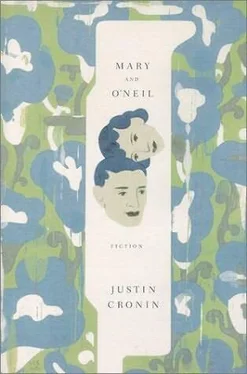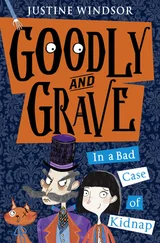
Justin Cronin
Mary and O’Neil
© 2001
Nobody sees it happen, but it does. For suddenly,
it seems, the woods are bare.
John Updike, “Leaf Season”
November 1979
ARTHUR IN DARKNESS -drifting, drifting-the planet spinning toward dawn: he awakens in gray November daybreak to the sounds of running water and a great arm brushing the side of his house. The wind, he thinks, the wind; the end of autumn, the last of the leaves pulled away. The running water, he understands, was never real. He lies in the dark of the bedroom he shares with his wife, waiting for the dream to fade-a dream in which, together, they sail over a cliff into blackness. What else? A sense of water below, a lake or stream, Miriam’s hand in his, of everything loosed from the earth; a feeling like accomplishment, shapes fitting together with mathematical precision, all the equations of the heavens ringing. A dream of final happiness, in which they, Arthur and Miriam, together, at the last, die.
Arthur rises, takes a wool sweater from the chair by his bed, pushes his feet into the warm pockets of his slippers. He draws the sweater over his head, his twisted pajama top; he puts on his glasses and pauses, letting his eyes, cakey with sleep, adjust. In the feeble, trembling light (The moon? A streetlamp? The day is hours off), he discerns the form of his wife, a crescent-shaped ridge beneath the blankets, and knows her face and body are turned away from him, toward the window, open two inches to admit a trail of cold night air. How is it possible he knows he is going to die? And that the thought does not grieve him? But the feeling, he believes, is just a tattered remnant of his dream, still near to him in the dark and cold of the predawn room, Arthur still, after all, in his pajamas; by breakfast it will recede, by lunchtime it will vanish altogether, dissolving into the day like a drop of iodine in water. Is it possible he is still asleep? And Arthur realizes this is probably true; he is fast asleep, standing in the icy bedroom, knees locked, his chin lolled forward into the downy fan of hair on his chest; he is, in fact, about to snore.
… To snore! And with this his head snaps to attention, his eyes fly open; he is, at last and truly, awake, dropped as if from a great height to land, perfectly uninjured, here. The living, breathing Arthur. But to be fifty-six years old, and dream of death, and not be afraid; this thought has somehow survived the journey into Arthur’s encroaching day, hardening to a kernel of certainty in his heart. He shakes his head at the oddness of this fact, then at the coldness of the room, Christ Almighty; even in the dark Arthur can see his breath billowing before him like a cloud of crystals. Below the blue bulk of their bedding his wife adjusts herself, pulling the blankets tighter, as if to meet his thought; a hump disengages itself from the small of her back, travels the width of the mattress to Arthur’s side, and vanishes with the sound of four paws striking the wide-plank floor. A flash of blond tail: the cat, Nestor, awakened from its spot between them, darts through the bedskirts and is gone. Enough, Arthur thinks; onward. He closes the window-a sudden silence, the wind sealed away from him-and departs the bedroom, shutting the door with a muffled snap. Behind it his wife will sleep for hours.
Downstairs, his mind on nothing, Arthur fills a carafe with water from the kitchen sink, pours it into the coffeemaker, scoops the fragrant dirt of ground beans into the paper filter, and turns on the machine; he sits at the table and waits. Dear God, he thinks, thank you for this day, this cup of coffee (not long now; the machine, sighing good-naturedly to life, exhales a plume of steam and releases a ricocheting stream into the pot), and while we’re at it, God, thank you for the beauty of this time of year, the leaves on the trees by the river where I walked yesterday, thank you for the sky and earth, which you, I guess, in your wisdom, will have to cover with snow for a while, so we don’t forget who’s boss. I like the winter fine, but it would be nice if it wasn’t a bad one. This is just a suggestion. Amen.
Arthur opens his eyes; a pale light has begun to gather outside, deepening his view of the sloping yard and the tangle of woods beyond. He pours the coffee, spoons in sugar, softens its color with a dollop of milk; he stands at the counter and drinks. Not a bad one, please.
Today is the day they will drive six hours north to see their son, a sophomore in college, lately and totally (or so he says, his voice on the phone as bright as a cork shot from a bottle: totally, Pop) in love. Arthur doesn’t doubt this is the case, and why should he? What the hell? Why not be in love? He sits at the kitchen table, dawn creeping up to his house; he thinks of the long day and the drive through mountains ahead of him, the pleasure he will feel when, his back and eyes sore from hours on the road, he pulls into the dormitory lot and his boy, long legged and smiling and smart, bounds down the stairs to greet them. In the foyer with its bulletin boards and scuffed linoleum and pay phone, the young lady watches them through the dirty glass. Susan? Suzie? Arthur reviews the details. Parents from Boston, JV field hockey first string (again the memory of his son’s voice, brightly laughing: But her ankles aren’t thick, the way they get, you know, Pop?); an English class they took together, Shakespeare or Shelley or Pope, and the way she read a certain poem in class, the thrilling confidence in her voice cementing the erotic bargain between them. (I mean, she looked right at me, Pop, the whole time, I think she had the thing memorized; you should have seen it, the whole class knew!) And Arthur knows what his son is saying to him: Here I am. Look. And Arthur does: Susan or Suzie (Sarah?), fresh from her triumphs of love and smarts in the marbled halls of academe, banging the hard rubber ball downfield on the bluest blue New Hampshire autumn day.
Sounds above: Arthur hears the bedroom door open, his wife’s slippered trudge down the carpeted hall, the mellow groan of the pipes as she fills the basin with water to wash. Arthur pours himself a second cup of coffee and fills a mug for Miriam-extra sugar, no milk-positioning it on the table by the back kitchen stairs. Outside the sky has turned a washed-out gray, like old plastic; a disappointment. For a while Arthur sits at the table and watches the sky, asking it to do better.
Miriam enters, wrapped in her pale-blue robe, and takes the coffee almost without looking, a seamless transaction that always pleases him. She sips, pauses, and sniffs at the mug.
“This is sort of old.”
“I’ve been up awhile,” Arthur says. “I’ll make a fresh pot if you want.”
“No, I’ll do it.” But she doesn’t; she takes a place at the table across from him. Her face is scrubbed, her combed hair pulled back from her face; she does not dye it, allowing the gray to come on without fuss, nor perm it, the way so many women they know have done. Arthur lets his eyes rest there, in the whiteness of the part of her hair, thinking of his dream, a vague disturbance that no longer creates in him any particular emotion, as the widest rings on pond water will lap the shore without effect. (Something about a lake? He no longer recalls.) She holds the cup of old coffee with both hands, like a hot stone to warm them, resting there on the table.
“What time is it?” She yawns. “Is it six-thirty?”
Arthur nods. “I thought we should get an early start. We can stop for lunch at that place in Northampton.”
Читать дальше













